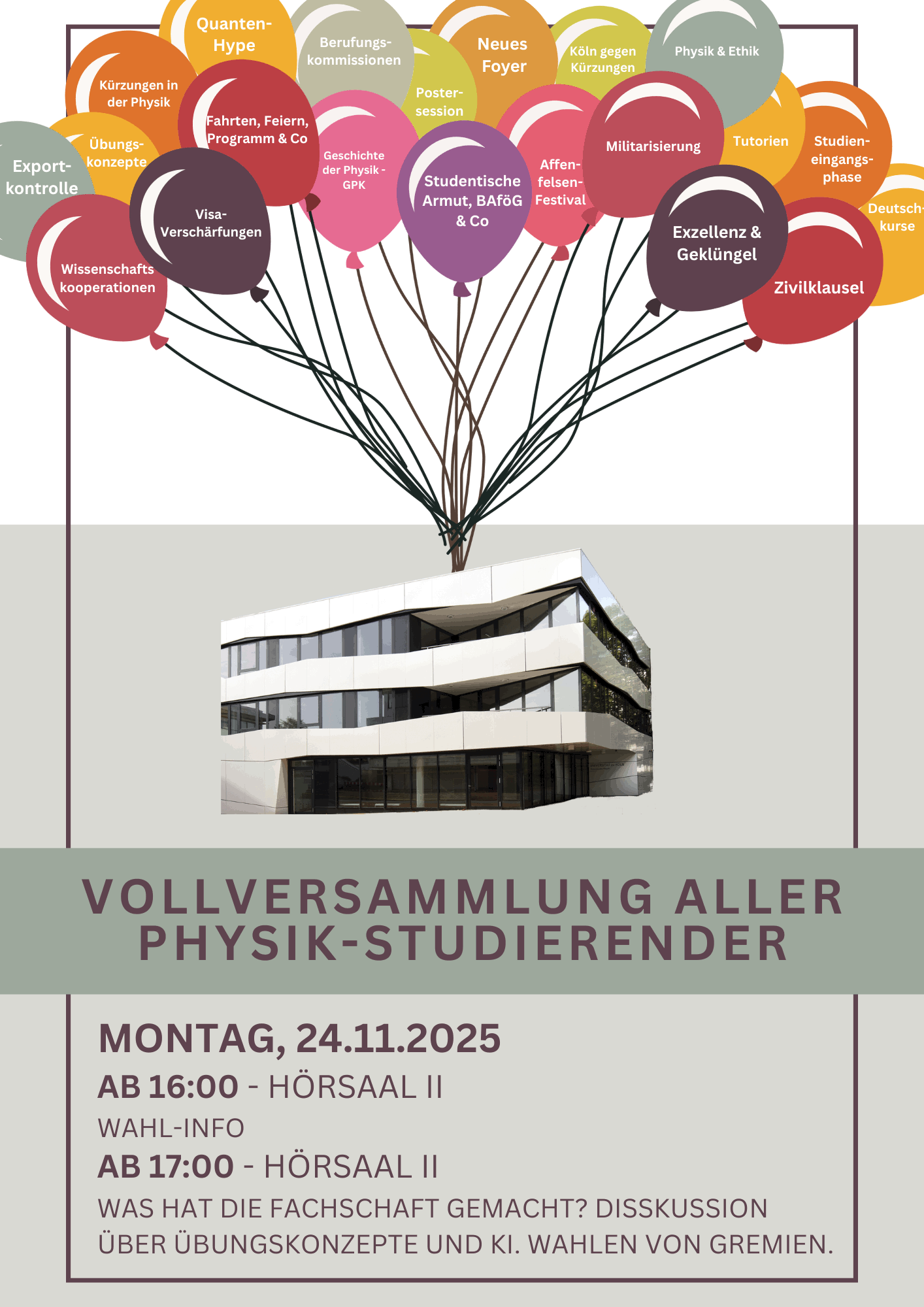Weihnachtsfeier // Christmas Party

| Diese Woche stehen Wahlen für die Gremien an. Das ist ziemlich wichtig, weil die Uni weitgehend selbst verwaltet ist. Sie entscheidet, wofür sie Geld ausgibt, wer hier arbeitet, welche Fachbereiche ausgebaut werden, wie die Studiengänge aussehen, die Gebäude ausgestattet sind, was die Konditionen des Semestertickets sind, welche Meinungen sie nach außen vertritt, etc.Dabei geht es um viele aktuelle und wichtige Themen, aber dabei noch den Überblick zu behalten wer für was kandidiert ist gar nicht so leicht.
Für mehr Details sprecht gerne mit den Menschen die Wahlkampf machen! Dieses Jahr finden die Wahlen erstmals vollständig online statt Also: Sprecht mit euren Kommiliton*innen und geht diese Woche wählen! |
This week, elections for the committees are coming up. This is quite important because the university is largely self-governing. It decides what it spends its money on, who works here, which departments are expanded, what the degree programmes look like, how the buildings are equipped, what the conditions of the semester ticket are, what opinions it represents to the outside world, etc.
There are many current and important issues at stake, but it’s not easy
For more details, please talk to the people campaigning! This year, for the first time, the elections will take place entirely So: Talk to your fellow students and go vote this week! |
Lieber Philipp, lieber Markus,
Advanced Seminars sind oft davon geprägt, dass Studierende reihum Vorträge halten, dabei über das Semester der rote Faden fehlt und es relativ wenig Interaktion gibt, wodurch die Teilnahme an den Vorträgen oft leider auch sehr gering ist.
Das im Wintersemester stattgefundene “Advanced Seminar on Physics with Ion Traps” versuchte dies auf verschiedene Arten zu durchbrechen: angefangen damit, dass ein Oberthema gewählt wurde, die Ionenfalle, welche in verschiedenen Bereichen der Physik Anwendung findet, jedoch in der Praxis oft nur aus dem eigenen Bereich beleuchtet wird. Von der allgemeinen Einführung in die Funktionsweise zu Beginn des Seminars an wurde darauf geachtet, sich nicht nur von einem/einer Expert*in berieseln zu lassen, sondern sich zB in Kleingruppen gemeinsam Passagen aus passenden Papern zu erschließen und gegenseitig zu erklären. Auch danach wurden Seminarvorträge, bei denen die Studierenden eigene Ideen wie zB Quizzes einfließen lassen konnten, eingebettet in Hands-on Phasen, in denen wieder in Gruppenarbeit zB Papier-Ionenfallen aus zur Verfügung stehenden Teilen mit unterschiedlichen physikalischen Eigenschaften gebastelt werden konnten.
Insgesamt wurde dadurch die oft natürlich vorkommende Rollenverteilung zwischen Vortragenden und Zuhörende aufgebrochen und der Lernprozess von einem reinen Aufsaugen von Wissen zu einer gemeinsamen Sache aufgewertet. Dafür wollen wir Markus Schiffer und Philipp Schmid den Lehrpreis übergeben.

|
Das Protokoll der Vollversammlung wird hier veröffentlicht werden.
|
The protocol of the General Assembly will be published here.
|

Termine
Im Wintersemester 2025/2026 bieten wir Tutorien für die Vorlesungen
sowie ein Tutorium für das Praktikum A an.
Termine und weitere Infos findet ihr hier.
Friday, November 7
17:30, ETP 0.01
-> Especially for new master students:
Counselling hour
18:30, ETP 0.03
Film Screening and discussion
We have several films we can choose from
You can also send us other ideas
Afterwards we’ll decide together:
Kiosk crawl, karaoke or party
-> spread the word!